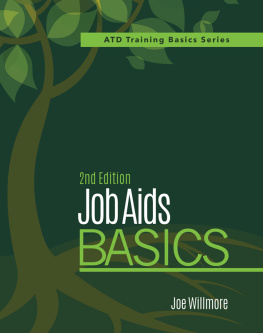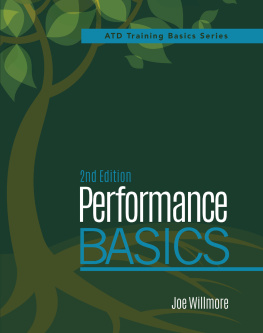Willmore - Job aids basics
Here you can read online Willmore - Job aids basics full text of the book (entire story) in english for free. Download pdf and epub, get meaning, cover and reviews about this ebook. year: 2018, publisher: ATD Press, genre: Home and family. Description of the work, (preface) as well as reviews are available. Best literature library LitArk.com created for fans of good reading and offers a wide selection of genres:
Romance novel
Science fiction
Adventure
Detective
Science
History
Home and family
Prose
Art
Politics
Computer
Non-fiction
Religion
Business
Children
Humor
Choose a favorite category and find really read worthwhile books. Enjoy immersion in the world of imagination, feel the emotions of the characters or learn something new for yourself, make an fascinating discovery.
- Book:Job aids basics
- Author:
- Publisher:ATD Press
- Genre:
- Year:2018
- Rating:3 / 5
- Favourites:Add to favourites
- Your mark:
- 60
- 1
- 2
- 3
- 4
- 5
Job aids basics: summary, description and annotation
We offer to read an annotation, description, summary or preface (depends on what the author of the book "Job aids basics" wrote himself). If you haven't found the necessary information about the book — write in the comments, we will try to find it.
Job aids basics — read online for free the complete book (whole text) full work
Below is the text of the book, divided by pages. System saving the place of the last page read, allows you to conveniently read the book "Job aids basics" online for free, without having to search again every time where you left off. Put a bookmark, and you can go to the page where you finished reading at any time.
Font size:
Interval:
Bookmark:


2018 ASTD DBA the Association for Talent Development (ATD)
All rights reserved. Printed in the United States of America.
21 20 19 18 1 2 3 4 5
No part of this publication may be reproduced, distributed, or transmitted in any form or by any means, including photocopying, recording, information storage and retrieval systems, or other electronic or mechanical methods, without the prior written permission of the publisher, except in the case of brief quotations embodied in critical reviews and certain other noncommercial uses permitted by copyright law. For permission requests, please go to www.copyright.com, or contact Copyright Clearance Center (CCC), 222 Rosewood Drive, Danvers, MA 01923 (telephone: 978.750.8400; fax: 978.646.8600).
ATD Press is an internationally renowned source of insightful and practical information on talent development, workplace learning, and professional development.
ATD Press
1640 King Street
Alexandria, VA 22314 USA
Ordering information: Books published by ATD Press can be purchased by visiting ATDs website at www.td.org/books or by calling 800.628.2783 or 703.683.8100.
Library of Congress Control Number: 2018946479
ISBN-10: 1-56286-636-2
ISBN-13: 978-1-56286-636-5
e-ISBN: 978-1-56286-682-2
ATD Press Editorial Staff
Director: Kristine Luecker
Manager: Melissa Jones
Community of Practice Manager, Learning and Development: Amanda Smith
Senior Associate Editor: Caroline Coppel
Cover Design: Francelyn Fernandez and Shirley Raybuck
Text Design: Shirley Raybuck
Printed by Data Reproductions Corporation, Auburn Hills, MI

Joe Willmore is president of the Willmore Consulting Group, a performance consulting firm located near Washington, D.C. He has more than 35 years of consulting experience with a wide range of organizations including the World Bank, Intelsat, Lockheed Martin, the U.S. Navy, Booz Allen Hamilton, the National Geographic Society, and the Smithsonian Institution. He has served on ATDs Board of Directors and held other leadership positions within ATD and other professional societies. His work has taken him to a range of countries and regions outside North America, including Russia, Turkey, Greece, and Central Asia.
Joe Willmore is the author of No Magic Bullet (ATD Press, 2009) and Performance Basics, 2nd edition (ATD Press, 2016) as well as Managing Virtual Teams (Chandos Press, 2003). He was also a contributor to What Smart Trainers Know (edited by Lorraine Ukens, Jossey-Bass/Pfeiffer, 2001) and HPI Essentials (edited by George Piskurich, ATD Press, 2002). In addition, he has written numerous articles for ATDs TD magazine and other publications.
Joe Willmore lives with his wife in Northern Virginia. When he isnt working, hes taking photos or with his dog, Ike. He can be reached at .
Campbell, C. 1996. Job Performance Aids. Journal of European Industrial Training 20(6): 3-22.
Chase, N. 1997. Job Aids When Memory Fails. Quality 36(12): 96.
Colvin-Clark, R., and C. Lyons. 2004. Graphics for Learning: Proven Guidelines for Planning, Designing and Evaluating Visuals in Training Materials. San Francisco: Jossey-Bass/Pfeiffer.
Elsenheimer, J. 1998. Job Aids in the Technology Age. Performance Improvement 37(8): 32-35.
Elswick, J. 2001. Performance Support Shapes Training Programs. Employee Benefit News 15(6): 39-42.
Franklin, M., and J. Rossi. 2001. On-the-Job Aid for Caregivers. Kiplingers Personal Finance 55(8): 82-83.
Gottfredson, C., and B. Mosher. 2011. Innovative Performance Support. New York: McGraw-Hill.
Hale, J. 1998. The Performance Consultants Fieldbook: Tools and Techniques for Improving Organizations and People. San Francisco: Jossey-Bass/Pfeiffer.
Hubbard, A. 2004. Determining the Scope of Training. Mortgage Banking 64(10): 110.
Lohr, L. 2002. Creating Graphics for Learning and Performance: Lessons in Visual Literacy. Upper Saddle River, NJ: Prentice-Hall.
Mager, R.F. 1984. Preparing Instructional Objectives. Belmont, CA: Lake Publishing.
Quinn, C. 2011. Designing mLearning: Tapping Into the Mobile Revolution for Organizational Performance. San Francisco: Pfeiffer.
. 2014. Revolutionize Learning and Development: Performance and Innovation Strategy for the Information Age. San Francisco: Pfeiffer.
Reynolds, A. 1998. Job Aids: Still a Performance Support Essential. Technical Training 9(1): 6-7.
Rossett, A. 1998. First Things Fast. San Francisco: Jossey-Bass/Pfeiffer.
Russell, S. 1997. Create Effective Job Aids. Infoline. Alexandria, VA: ASTD Press.
Salopek, J.J. 2004. Balancing Work and Learning. T+D 58(7): 16-19.
Spaulding, K., and F. Dwyer. 2001. The Effect of Time on Task When Using Job Aids as an Instructional Strategy. International Journal of Instructional Media 28(4): 437-448.
Tufte, E. 1990. Envisioning Information. Cheshire, CT: Graphics Press.
. 2001. The Visual Display of Quantitative Information. Cheshire, CT: Graphics Press.
Udell, C. 2012. Learning Everywhere: How Mobile Content Strategies Are Transforming Learning. Nashville: Rockbench Publishing.
Van Tiem, D., J. Mosely, and J. Dessinger. 2012. Fundamentals of Performance Improvement, 3rd Edition. San Francisco: Pfeifer.
Zielinski, D. 2000. The Shape of Things to Come. Training 37(1): 26-36.
ATDs Training Basics series recognizes and, in some ways, celebrates the fast-paced, ever-changing reality of organizations today. Jobs, roles, and expectations change quickly. One day you might be a network administrator or a process line manager, and the next day you might be asked to train 50 employees in basic computer skills or to instruct line workers in quality processes.
Where do you turn for help? The ATD Training Basics series is designed to be your one-stop solution. The series takes a minimalist approach to your learning curve dilemma and presents only the information you need to be successful. Each book in the series guides you through key aspects of training: giving presentations, making the transition to the role of trainer, designing and delivering training, and evaluating training. The books in the series also include some advanced skills, such as performance and basic business proficiencies.
The ATD Training Basics series is the perfect tool for training and performance professionals looking for easy-to-understand materials that will prepare nontrainers to take on a training role. In addition, this series is the consummate reference tool for any trainers bookshelf and a quick way to hone your existing skills.
When I first began work as a trainer, I was initially surprised at how useful and effective job aids always seemed to be. Starting out in training, perhaps I was guilty of assuming that if a solution didnt involve formal, structured training as a means of passing on knowledge, it couldnt be effective. Additionally, I really couldnt appreciate the value of something that can be as simple as a laminated piece of paper small enough to fit in a shirt pocket.
Font size:
Interval:
Bookmark:
Similar books «Job aids basics»
Look at similar books to Job aids basics. We have selected literature similar in name and meaning in the hope of providing readers with more options to find new, interesting, not yet read works.
Discussion, reviews of the book Job aids basics and just readers' own opinions. Leave your comments, write what you think about the work, its meaning or the main characters. Specify what exactly you liked and what you didn't like, and why you think so.












